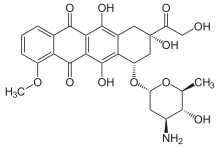Cardiotoxins
Cardiotoxicity are specific to the heart muscle acting poisons . Functionally, these act like neurotoxins .

Cardiotoxins are mainly found in snake poisons , the nettle poison of cnidarians , in toads and in other animal poisons . The toxins have an irreversible depolarizing effect on the cell membranes of the heart muscle cells and thus lead to paralysis , the result of which can be cardiac arrest .
All cardiotoxins of the poisonous snakes (Elapidae) are peptides or proteins with a size of 60 to 63 amino acid units and four disulfide bridges ; they are also referred to as CTX for short . The poison of the Indian cobra, also known as cardiotoxin or CTX II , Naja naja is effective in a concentration of 10 µg / mL and leads to the complete depolarization of muscle cells in vitro in a few minutes . Poisons from vipers rarely have a cardiotoxic effect, they are usually haematotoxic .
Individual evidence
- ^ Wissenschaft-Online-Lexika: Entry on cardiotoxins in the compact lexicon of biology, accessed on December 8, 2009.
- ↑ Yasutsugu Shimonishi: Peptide science, present, and future. Gulf Professional Publishing, 1999, ISBN 9780792352716 , pp. 555-559.
- ↑ Anthony T. Tu: Handbook of natural toxins, Volume 5: Reptile venoms and toxins. CRC Press, 1991, ISBN 9780824783761 , p. 87.